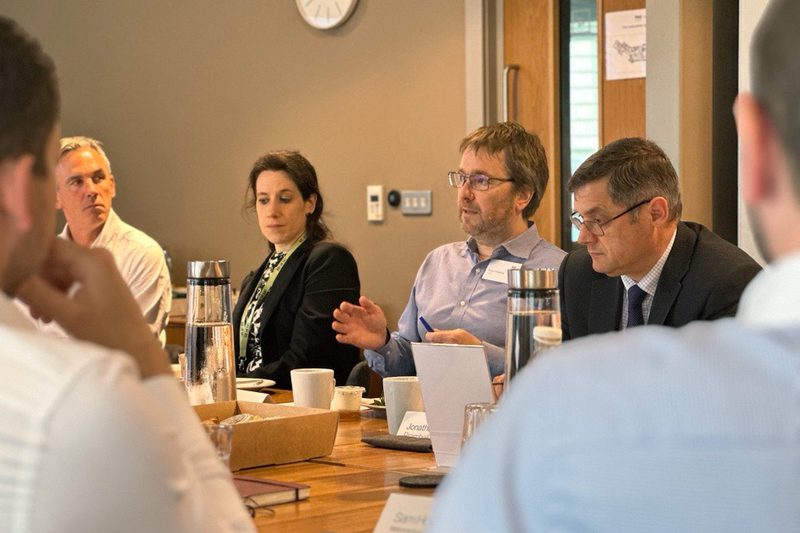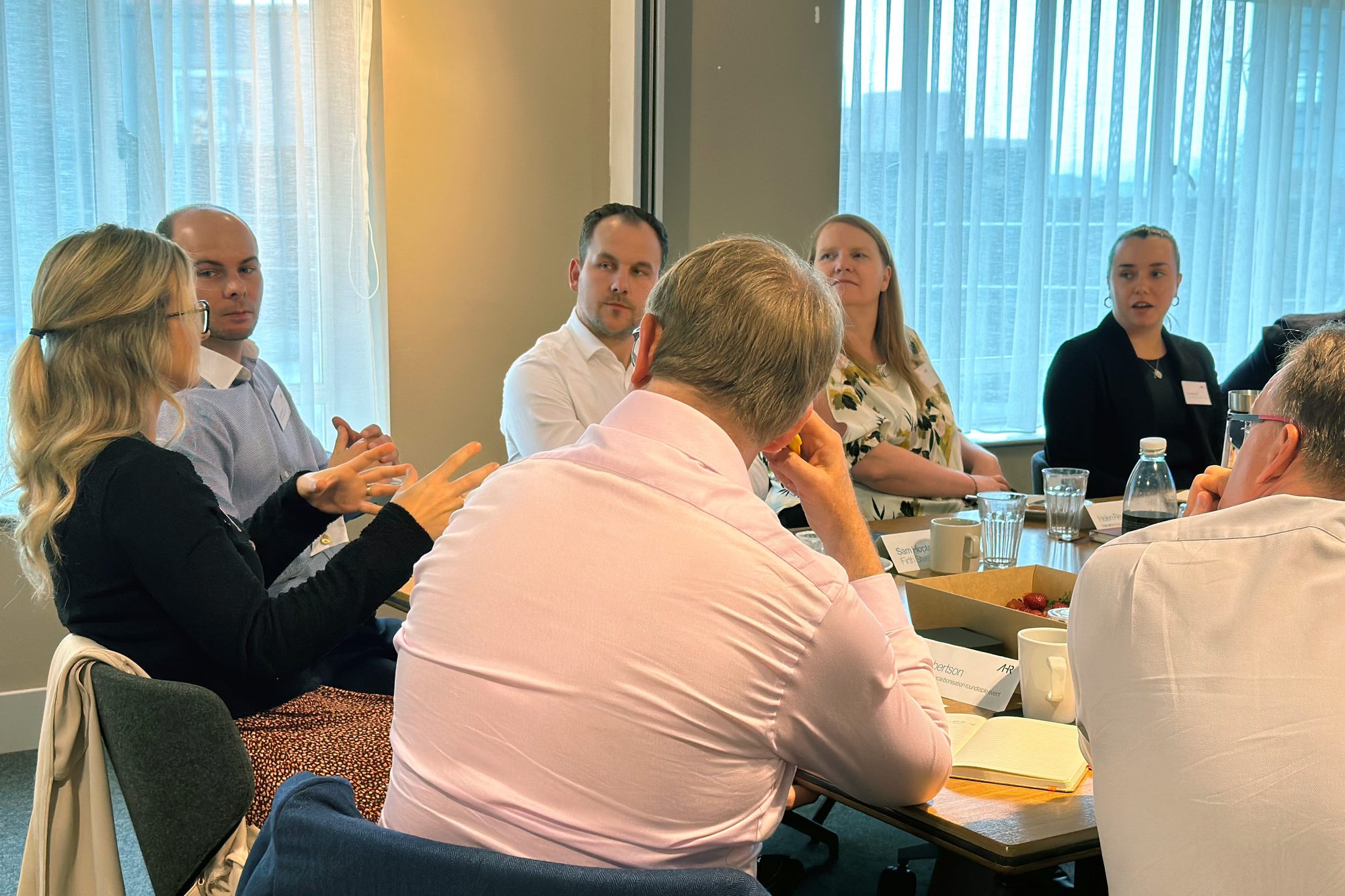
Practice News
Achieving decarbonisation: shared thoughts from Leeds
by AHR
We were joined by industry professionals in Leeds for our fourth roundtable event of the year, exploring the challenges and opportunities in decarbonisation.
The discussion focussed on how we are navigating forthcoming changes in building performance standards and legislation and brought up some interesting themes.
Similar themes emerged from our previous events, particularly the challenges around standardisation and legislation. Interestingly, in Leeds, we also discussed the implementation of Biodiversity Net Gain (BNG) and explored how the connection between people and nature can drive effective decarbonisation.
Continue reading for more insights from the discussion.
1. Navigating the net zero carbon journey: regional differences
One key insight from the discussion was the varying appetite for net zero carbon investments across different markets. For example, in Bristol, developers have been relatively successful in refurbishments and new builds focusing on sustainability. One participant found that this success is driven by the demand from office market employees who want to work in environmentally conscious spaces. However, these more sustainable buildings come at a premium cost, which invites consideration of the market’s willingness and capacity to take on these expenses.
In contrast, in places like York, heritage and conservation make development and financial viability more challenging. The preservation of historical sites often limits the scope for modern sustainable practices, showing a significant regional variance in the feasibility and acceptance of net zero carbon investments.
2. Standardisation and compliance: the challenges
Businesses face difficulties aligning with varying sustainability standards, often featuring unclear terminologies and objectives. The new UK Net Zero Carbon Buildings Standard is expected to offer a uniform framework, addressing this issue and supporting a more level playing field. Something that the participants all agreed upon and would welcome.
However, integrating diverse sustainability standards into corporate strategy remains complex. Businesses must balance regulatory compliance with sustainability innovation, often customising approaches to meet both global standards and local expectations. Aligning with the EU Taxonomy regulations, for instance, demands extensive resources. The EU Taxonomy is a classification system designed to define and promote environmentally sustainable economic activities. It aims to combat greenwashing by establishing clear criteria for sustainability, guiding investments towards genuinely sustainable projects.
Additionally, there is a recurring call for consistent measurement and monitoring strategies, broadening the scope beyond operational carbon to include embodied carbon for a comprehensive environmental impact assessment. This aligns with the need for a standardised net zero carbon building standard across the UK to support a collective effort in decarbonization and level the playing field for different businesses.
The impact of international legislation, such as the EU Taxonomy regulation, New York’s Local Law 97 (LL97) and the IFRS S1 and S2 Sustainability Disclosure Standards, remains significant in the UK. Developers must comply with global regulations to maintain and enhance asset value, even if they are not seeking external financing. International guidelines on sustainability, energy performance, and carbon reduction shape local practices and expectations, driving the need for compliance to retain competitive advantage and asset worth.
3. Legislation and policy on business practices: the impact
Another key point raised, and vastly agreed upon, was the unpredictability of legislative changes posing significant challenges for businesses, which require stable conditions for planning and investment decisions. The financial burdens of complying with new regulations, such as BNG and net zero carbon standards, were key talking points. There were calls for government support mechanisms, including subsidies or tax incentives, to aid the transition to sustainable practices.
Active engagement between businesses and policymakers is crucial for crafting practical legislation that advances sustainability goals while considering business implementation challenges. The discussion also explored the upcoming Future Homes Standard. Set for 2025, this standard will require all new homes to be built with energy efficiency in mind and use low carbon heating systems.
While the NHS’s new net zero building standard, published in early 2023, represents progress, its implementation is hindered by significant financial and technical challenges. Balancing ambitious sustainability goals with practical budgetary constraints and operational needs was a recurring theme.
Many businesses feel uncertain about reducing Scope 3 emissions, which represent indirect emissions in their value chain. Addressing this challenge requires collaboration, as each business impacts others’ Scope 3 emissions. Working together is essential to effectively manage and reduce these emissions.
Encouragingly, some organisations are taking proactive steps to tackle this issue. For instance, one university has committed to partnering exclusively with businesses that are actively pursuing the goal of achieving net-zero carbon emissions by 2030.

4. Biodiversity Net Gain: implementation and challenges
Implementing BNG presents unique challenges, from variability in ecological assessments to measuring the actual benefits or impacts. The shortage of skilled ecologists and inconsistent methodologies further complicate these efforts. Concerns about the long-term management and monitoring of biodiversity initiatives underscore the need for sustained funding and clear responsibilities.
Participants showed keen interest in the ongoing work in West Yorkshire, where an opportunities map is being developed. This map aims to initially connect nature across the region, with plans to expand the initiative throughout England. West Yorkshire will serve as a crucial component of broader nature recovery strategies across the country, contributing to a landscape-scale recovery effort.Additionally, a fascinating research study being carried out at the University of Derby was brought to the table, which explores the relationship between people and the rest of nature, and how this relationship supports pro-nature behaviours. The group was encouraged to read more about the study, and you can too here.
For more insights on the connection between people and nature, the new legislation around BNG and how Nature Recovery Strategies, like the one in West Yorkshire, can support our objectives, listen to our latest podcast episode here.
5. Educational gaps: the need for more knowledge
Recognising the need for increased investment in sustainability training and development, attendees discussed the potential of platforms for exchanging best practices and innovative solutions. Such platforms could help businesses learn from each other and accelerate the adoption of sustainability practices.
A key insight from our discussion centred on the supply chain and construction sectors. It is crucial for the industry to move beyond operational carbon and embrace the whole life cycle for decarbonisation. One notion was that to truly achieve decarbonisation, we must prioritise training professionals who can deliver net zero carbon buildings and fully address Scope 3 emissions.
We need to adopt a holistic approach that evaluates the entire life cycle of a building, from construction and materials to demolition and disposal.”
6. Heading in the right direction: Commendable global actions and future initiatives
Despite the various policy setbacks, particularly from the UK Government recently, commendable actions worldwide must not be ignored. Last year, the US introduced the Inflation Reduction Act, a substantial £783 billion package designed to address climate change. There is also the European Green Deal established in 2020 which aims to make Europe the first climate-neutral continent by 2050, with initiatives including reducing greenhouse gas emissions by at least 55% by 2030 compared to 1990 levels.
What was evident was that these actions will positively impact the UK and its approach to climate action, reminding us that moving forward in the right direction is crucial, even without a level playing field.To learn more about our efforts in achieving decarbonisation through retrofit and other initiatives, visit our perspectives page here.
Share on
Related Articles

Practice News
Achieving decarbonisation: Insights from Glasgow
Our second decarbonisation roundtable event of 2024 saw us in Glasgow, where we were joined by industry professionals to discuss and explore challenges and opportunities of decarbonisation.
Date: 8 May 24
by AHR

Practice News
Achieving decarbonisation: Continuing the conversation in Birmingham
We were joined by industry friends, eager to discuss the challenges and opportunities of decarbonisation and how we’re navigating forthcoming changes in building performance standards and legislation.
Date: 30 Apr 24
by AHR

Thought Leadership
The Retrofit Toolkit in action
The first of our retrofit studies challenged us to propose six interventions to decarbonise a typical school building to reduce its energy usage.
Date: 3 Feb 23
by Robert Hopkins
Director, Architecture
Practice News
Achieving decarbonisation: Insights from our Liverpool discussion
We brought together industry professionals in Liverpool to discuss the challenges and opportunities in decarbonisation.
Date: 24 Jun 24



